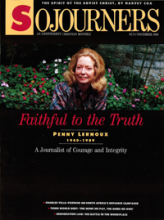One of my buddies from college is a poet. He also writes advertising copy. He's not like Mikey, the sensitive ad guy on thirty-something, with his night classes and terrible short stories. He is thirty-something, but this guy really is a poet.
For several years he worked the poetry circuit of fellowship-hustling, publication-hustling, writers' retreats, and the like. He was even an official "poet-in-the-schools" for a while.
Then a few things happened. For one, he got tired of being broke all the time. But he also decided that the ad biz was, if anything, a more honest way to make a buck than its high-literature counterpart. At least in advertising everyone admits that they're selling something.
In his case anyhow, that wasn't a cop-out. He still writes his poetry. And, from what I've seen, it continues to get better. Maybe the ad work will help. After all, rhythm and condensation are key tools of both trades.
In a way my friend is just living proof of the fact that, in late-capitalist America, the advertising industry is the true patron of the arts. In earlier, more primitive times the talents of society's creative artists were subsidized by church or state to serve Christendom, the nation, or even that great lost concept, "the common good." Then patronage was passed to the nobility and the super-rich who subsidized art and artists to satisfy their vanity, or to fill their surfeit of leisure time.
But capitalism is a restless, and hungry, beast that eventually demands the "commodification" of every person, place, and thing -- and every human endeavor and ideal -- that falls in its path. Today's super-duper-rich do still buy painting and sculpture. But they don't buy for vanity. They do it as an investment.
Read the Full Article

